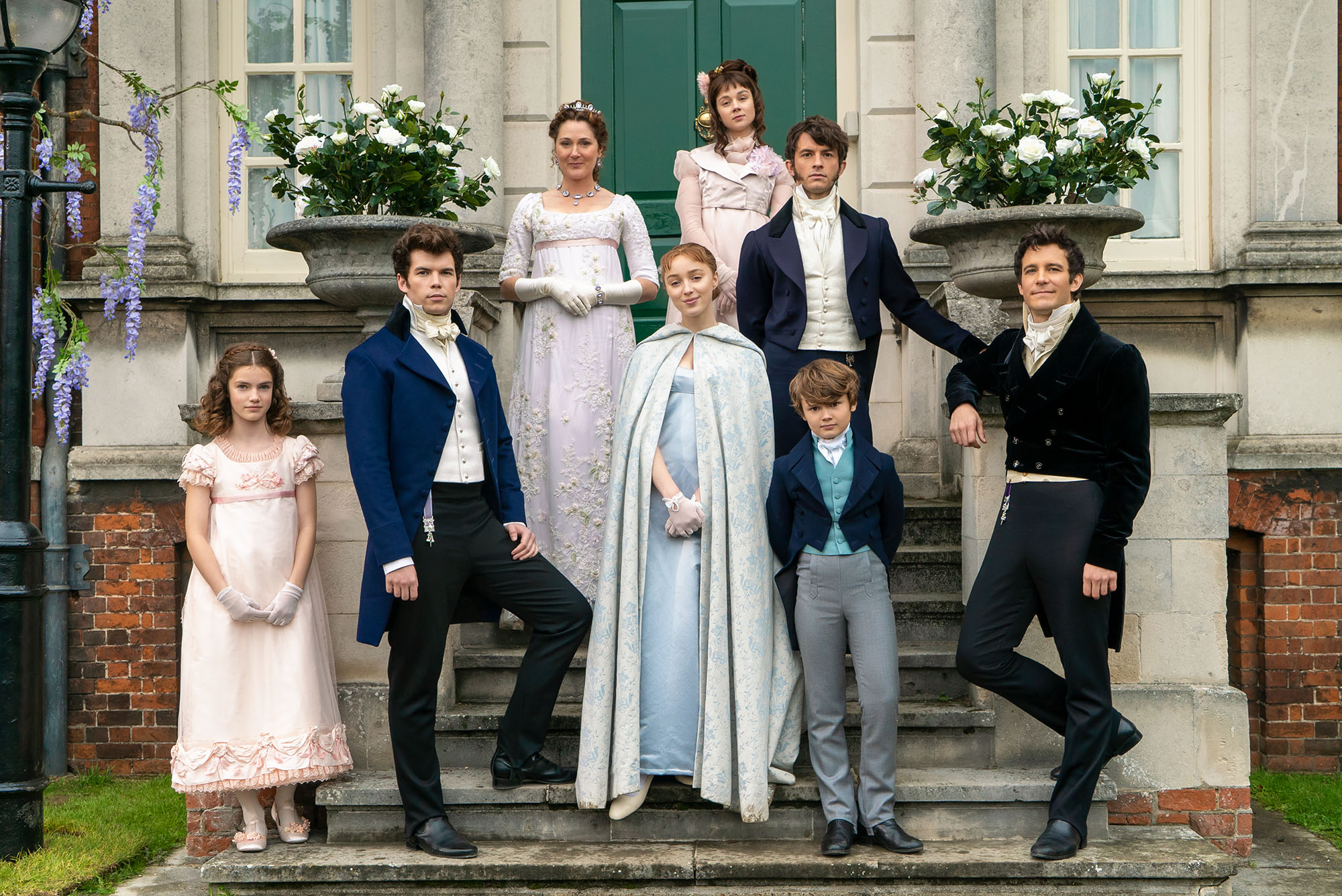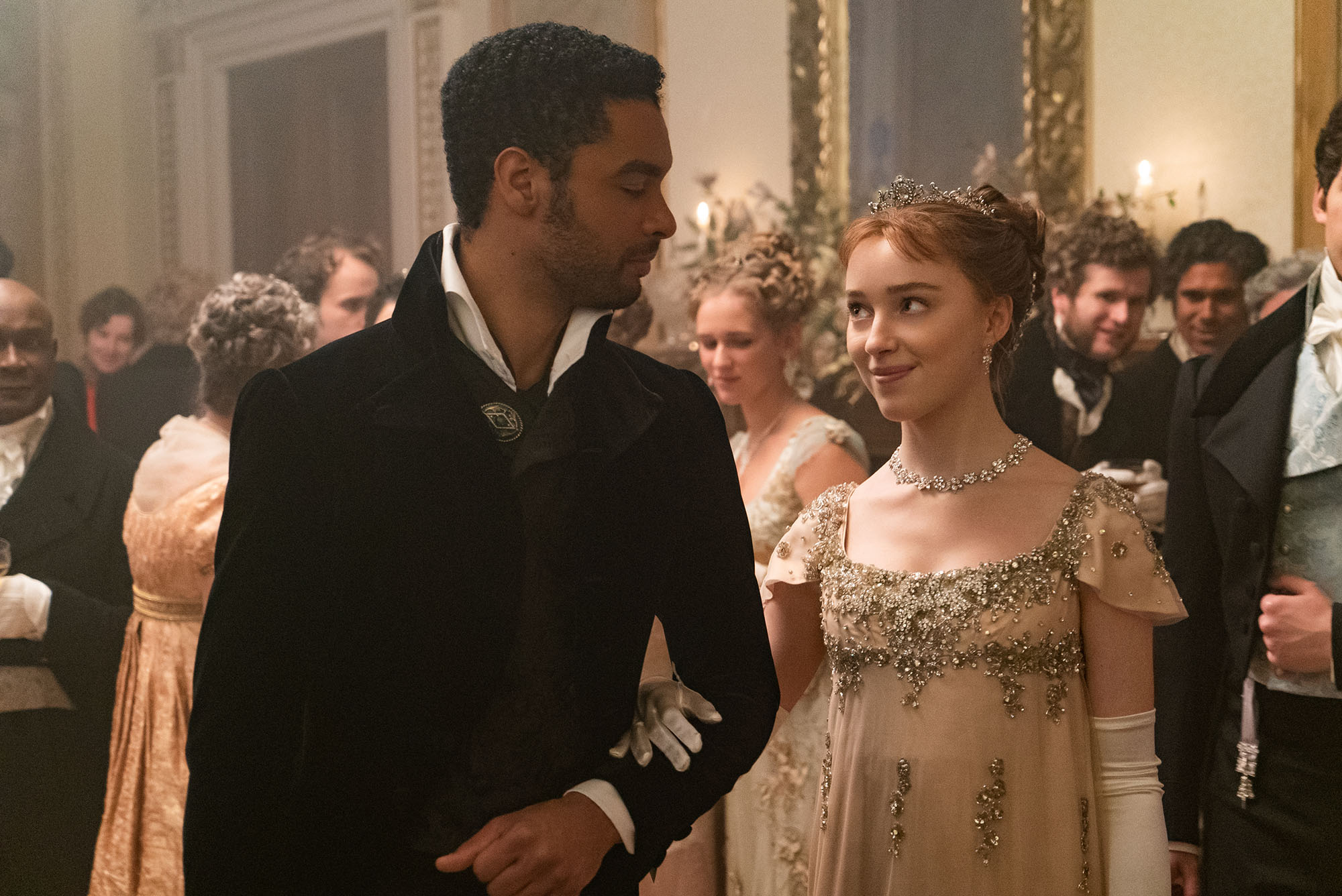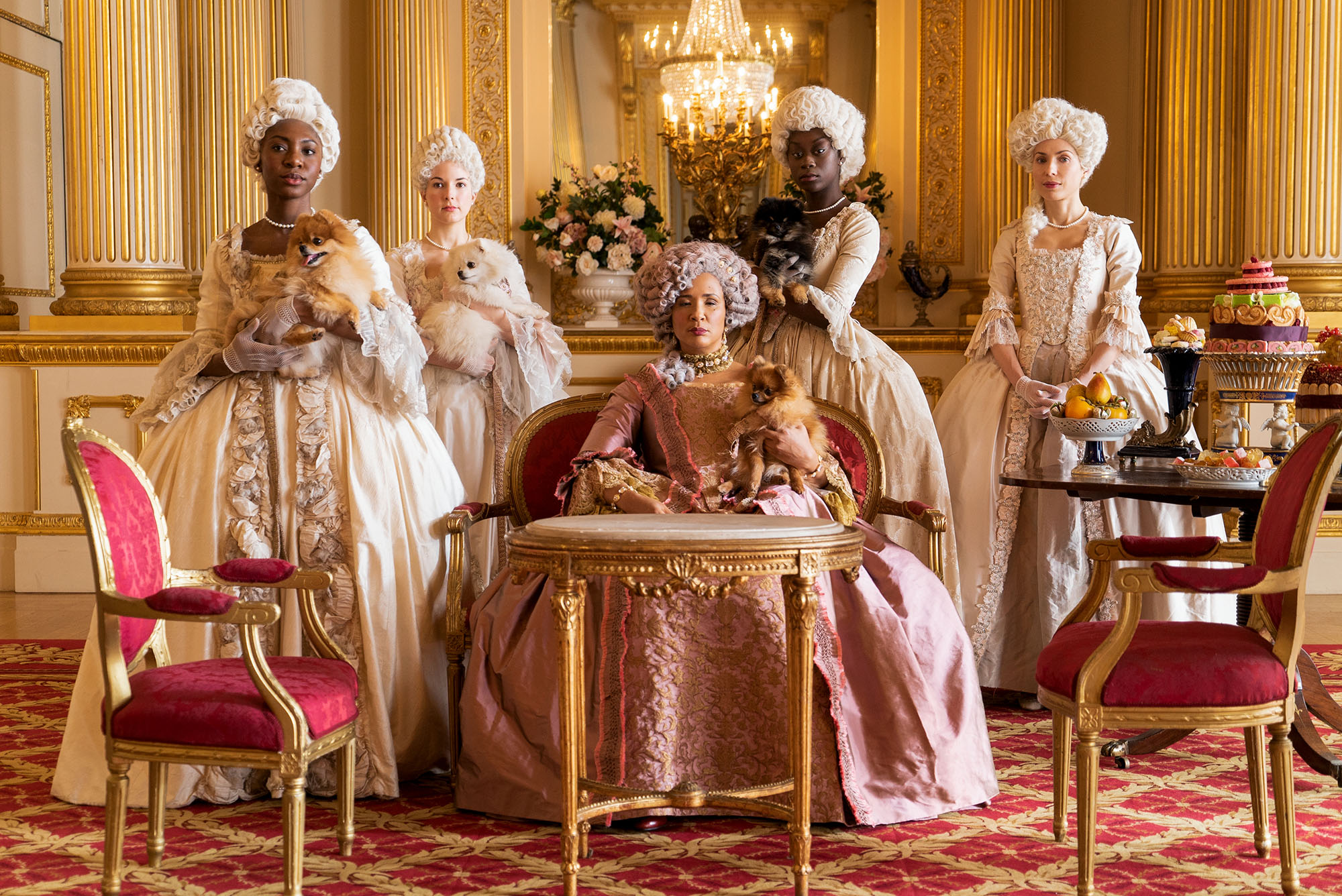Although the holidays this year will be socially distanced for many, fans of a certain breed of period drama can get their thrills at home with the Christmas Day release of Bridgerton, Shonda Rhimes’ soapy, sexy new romance series for Netflix. The show, the first to debut from Shondaland’s exclusive multi-year development deal with the streaming platform, has no shortage of Rhimes’ trademark high-octane drama, thanks in large part to its source material, Julia Quinn’s Bridgerton series. The popular historical romance novels, which center around the wealthy and titled Bridgerton family in the high society but scandal-ridden world of Regency-era London, have become beloved for their inversion of longtime romantic tropes with refreshingly modern values.
Netflix’s eight-part series focuses primarily on the love affair between Daphne Bridgerton (Phoebe Dyenevor), London’s newest and most pursued debutante, and Simon Bassett (Regé-Jean Page), the rakish Duke of Hastings. The proceedings are laid out by a Gossip Girl-esque narrator, Lady Whistledown (voiced by Julie Andrews), the unseen, but all-knowing author of a salacious society page. And while this initial season of Bridgerton centers on Daphne and Simon, the eight Bridgerton books follow the escapades of all eight Bridgerton siblings—giving Netflix plenty of material for potential future seasons.
Here’s what to know about the Bridgerton books that inspired Netflix’s new show.

What to know about the Bridgerton book series and its author, Julia Quinn
While the Netflix show includes many of the characters and plotlines of Quinn’s entire Bridgerton book series, it is mainly based on The Duke and I, the first novel in her collection, which chronicles a fake courtship scheme-turned-real romance between the eldest Bridgerton daughter, Daphne, and London’s most eligible bachelor, the Duke of Hastings.
Each of the eight Bridgerton siblings, who are alphabetically named in chronological order—Anthony (The Viscount Who Loved Me), Benedict (An Offer From a Gentleman), Colin (Romancing Mister Bridgerton), Daphne (The Duke and I), Eloise (To Sir Phillip, With Love), Francesca (When He Was Wicked), Gregory (On the Way to the Wedding), and Hyacinth (It’s In His Kiss)—is the subject of his or her own novel, although the books should not be read in the order of their births. The series, which Quinn wrote between 2000 and 2006, now also includes prologues, epilogues and related novellas in the larger universe of the Bridgertons.
Quinn’s immense popularity via the Bridgerton series has helped to make her one of the foremost romance writers of her generation, with many dubbing her the “contemporary Jane Austen.” Although her Bridgerton books take place in London, Quinn is an American writer, who graduated from Harvard and briefly attended medical school at Yale, before pursuing writing full-time. The decision has paid off: to date, more than 10 million copies of her books have been published in the U.S. and her work has been translated into 32 languages. She’s also one of only 16 authors to have been inducted into the Romance Writers of America Hall of Fame. While Quinn didn’t adapt the books for the Netflix series, she did serve as a consultant for the show and has been a vocal supporter of its streaming revamp.
“With a series, you’ve got hundreds of people able to bring their imagination and lived experiences to it,” Quinn told Shondaland.com in a December 2020 interview about the Netflix adaptation. “It expands the world so much in a way that I’m not able to as a single human being… it’s not a word-for-word adaptation and it shouldn’t be. But the characters and the plot are absolutely true to who and what they were in the book, and remarkably so.”

What to know about Shonda Rhimes’ Bridgerton adaptation for Netflix
Although Bridgerton is a period piece, it boasts many of the signature markers of a contemporary Shonda Rhimes production, including jaw-dropping drama, diverse casting and the exploration of topics like gender equality and sexual orientation. The show’s first season, which is comprised of eight one-hour episodes, was primarily filmed in London and Bath, England. The show’s creators also consulted Dr. Hannah Grieg, a senior lecturer in early modern history from the University of York, to make sure historical elements were accurate.
However, the series also took plenty of creative liberties when it came to crafting the period piece. For one thing, showrunner Chris Van Dusen and executive producer Betsy Beers chose to do inclusive casting, casting many BIPOC actors in roles of British nobility, during a time when historically, they may not have held these positions. “It’s not color-blind casting,” Beers told Entertainment Weekly of the decision in a November 2020 interview. “We try to imagine history and the world in the way we wanted to see it.”
Other modern elements may also pique the interest of viewers; while the balls reflect the decorum of London’s high society in the 1800s, much of the music played at them are string quartet renditions of contemporary hits like Ariana Grande’s “thank u, next” or Maroon 5’s “Girls Like You.”
And the costume design is decidedly flashier and more colorful than one might expect from the Regency era. In an interview with Vogue, costume designer Ellen Mirojnick revealed that bonnets, a proprietary wardrobe staple of that time, were banned from set, as well as the requisite muslin dresses that have become synonymous with Austen adaptations, to keep the aesthetic of the show fresh and modern. As an alternative, she crafted playful hair pieces that hinted at the bonnets the women would have worn. And when it came to materials, the nearly 7,500 pieces of the show’s wardrobe utilized bright fabrics, rhinestones, feathers and embellishments to tell the decidedly nontraditional tales of the colorful characters in the Bridgertons’ world.

What to expect from Bridgerton in the future
While the series has only been picked up by Netflix for one season, there’s a wealth of material in Quinn’s other Bridgerton novels that can be expanded upon for possible additional seasons. Judging from the enthusiastic response to the series so far, it appears the interest is there.
More Must-Reads from TIME
- Cybersecurity Experts Are Sounding the Alarm on DOGE
- Meet the 2025 Women of the Year
- The Harsh Truth About Disability Inclusion
- Why Do More Young Adults Have Cancer?
- Colman Domingo Leads With Radical Love
- How to Get Better at Doing Things Alone
- Michelle Zauner Stares Down the Darkness
Write to Cady Lang at cady.lang@timemagazine.com